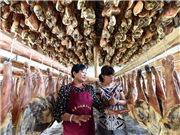

3. Implementing the overall plan for deepening reform of the fiscal and tax systems
We will, in keeping with the requirements for deepening reform of the budget management system, review and regulate tax relief and other preferential policies, carry out medium-term fiscal planning, and reform and improve the transfer payments system. We will raise the percentage of earnings from state capital operations that are turned over to public finance, and research into bringing more SOEs under the management of state capital operations budgets. We will promote sustainability in the operations of social security funds on the basis of actuarial balance. We will formulate and introduce the guidelines for fully promoting openness in budgetary work, and go further to make budgetary work more transparent. We will research into increasing the number of government departments required to report their budgets to the NPC.
We will strive to extend the trials for replacing business tax with VAT to the construction, real estate, financial, and consumer service industries; and allow businesses to deduct the VAT on their new real estate purchases or on their payments for real estate rentals, and combine and lower VAT rates. We will continue to adjust the scope and rates of consumption tax, and take measures where appropriate to levy consumption tax on retail and wholesale instead of production. We will organize the implementation of reform of the resource tax and fees on coal, and develop plans for reforming resource taxes and fees on other types of resources aside from crude oil, natural gas, and coal. For the reform of personal income tax, we will develop a plan that integrates taxation based on both adjusted gross income as well as specific types of incomes.
When carrying out reforms in VAT and consumption tax, we will find a way to improve revenue distribution between the central and local governments. We will develop and introduce guidelines for appropriately dividing powers and spending responsibilities between the central and local governments.
We will move more swiftly to reform government procurement of services, establish a management system for listing services for government procurement, and gradually expand the scope and scale of government service-procurement.
4. Strengthening budgetary management
We will collect revenue in accordance with the law and act to do so to the fullest possible extent wherever revenue is due, while strictly prohibiting the collection of any tax or fee not prescribed by law as well as any act, such as accounting tricks, that boost revenue only on paper, thereby ensuring that revenue is as it should be and remains free from tampering.
We will tighten constraints on budgets and strengthen adherence to them, making sure that wherever there is spending there is first a budget; where something has not been budgeted for no expenditures are allowed, and where a planned adjustment to expenditure has not gone through the legally prescribed procedures it may not be made.
We will improve the system of standards for setting basic expenditures and project expenditures in the budgets, optimize the management of project databases, and strengthen the foundation of our budgetary work. We will improve the methods used for formulating budgets; significantly cut down the total size of expenditure budgets prepared by finance departments for other departments and projects; place greater emphasis on practicability and detail in the formulation of budgets; and make budget formulation more farsighted and accurate. We will improve the mechanisms for exercising dynamic monitoring of budget implementation, set up a sound system of accountability for budgetary spending, and make the implementation of budgets more efficient and balanced.
We will practice thrift in everything we do, and ensure that the system for ensuring strict austerity and fighting waste firmly takes root. We will reduce general expenditures, strictly control the spending of central government departments on official visits, official vehicles, and official hospitality and, in accordance with the regulations on the reform of the use of official vehicles, reduce expenditures on official vehicles.
We will continue to rectify the practices of doctoring the payroll and deliberate overstaffing. We will categorize the ways to make use of available government funds, and establish a sound, permanent mechanism for reviewing and regulating carryover and surplus funds.
We will proactively move ahead with cash management operations through the treasury by the central and local governments. We will put into action the idea of linking spending with performance and performance with accountability. We will raise the level of and expand the scope for assessing budget performance; strengthen performance assessment on expenditures that are of particular significance to the people’s wellbeing; intensify accountability for budget performance; and improve the mechanism for linking the results of budget performance assessment with budget allocation.
By the end of 2015, we will have put into effect reform of centralized treasury payment in all townships and towns where conditions permit, and we will gradually expand the application of digital centralized treasury payment.
We will increase open access to information on government procurement, and further standardize the management of government procurement.
 |  |
Day|Week

 Tsinghua junior makes over 10,000 yuan a day by selling alumnae's used quilts
Tsinghua junior makes over 10,000 yuan a day by selling alumnae's used quilts Graduation photos of students from Zhongnan University
Graduation photos of students from Zhongnan University A school with only one teacher in deep mountains
A school with only one teacher in deep mountains Glimpse of cultural heritage "Xilankapu"
Glimpse of cultural heritage "Xilankapu" Homemade cured hams in SW China
Homemade cured hams in SW China Breathtaking buildings of W. Sichuan Plateau
Breathtaking buildings of W. Sichuan Plateau Graduation photos of "legal beauties"
Graduation photos of "legal beauties" Top 10 most expensive restaurants in Beijing in 2015
Top 10 most expensive restaurants in Beijing in 2015